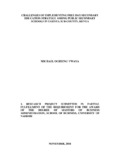| dc.description.abstract | Strategy is integral to the success of an organisation since it offers definition to its
business direction, performance level and competitive edge. More often, alot of effort
is put on strategy design than actual implementation or diregard of processes that
offer timely identification and mitigation of implementation challenges by managers
leading to undesired results. Noble strategies deployed more so in the public sector
suffer most leading to their collapse. Free Day Secondary Education (FDSE)
introduced by the Kenyan government in 2008 as a strategy to increase access, lower
household costs and improve academic performance in public secondary schools
through an annual Kshs. 10,265 subsidy per student has over the 2008-2012 period,
achieved rise in students’ enrolment to 1.77 Million, number of schools to over 6,051,
Kshs. 17.5 Billion annual disbursement and improved student-book ratio. However,
implementation challenges that might hinder its success and sustainability have over
this time frame not been fully investigated. This study sought to establish the
challenges experienced by public secondary school principals in FDSE
implementation in Ugenya sub-county as well as determine the mitigation measures
put in place to overcome the challenges. A total of 24 principals of public secondary
schools were targeted in this descriptive census survey study in the sub-county
whereby semi-structured questionnaires were utilised to gather data. Quantitative data
captured from the respondents was coded, fed into a computer spreadsheet then
analysed using SPSS software through descriptive statistics measures. The results
were presented as frequency tables, pie charts and bar graphs. Inspite of student
enrolment rising by 44.8% in Ugenya sub-county in the 2008-2012 period of FDSE
execution, high inflation leading to high food and fuel prices, inadequacy and delays
in disbursement of FDSE funds, poor communication, insufficient physical facilities
and teaching staff leading to heavy teaching load were the major challenges faced by
principals in implementing FDSE. To mitigate on these, 75% of schools practised
day-schooling to cut down on recurrent costs and increase access, 42% of teachers
were on temporary employment to reduce teaching workload and encouragement of
fee payment by use of alternatives. From these findings, FDSE fund need to be
doubled and disbursed promptly. In Ugenya sub-county there is need to increase
investment in physical and learning resources, teaching staff, undertake routine
external audit, enhance Information Technology integration to improve on
communication and inservicing of principals in strategic management practices to
instil creativity for proper government strategy implementation. Results from this
study reinforce the need to break down strategy implementation to incorporate
systematic planning cycles as well as investigate the impact of these mitigation
measures on performance of such public sector-oriented strategies. | en_US |

